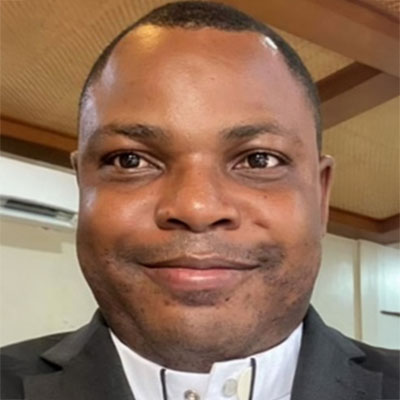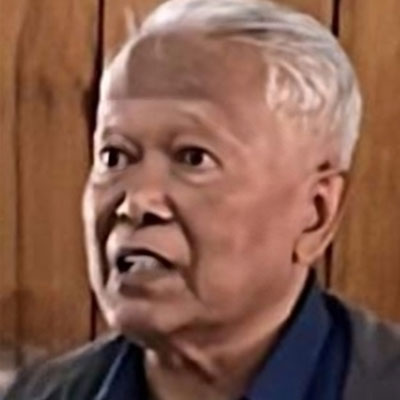Disturb Us, O Lord
- REFLECTIONS
- Hits: 11460
 by Adorable Castillo, cicm
by Adorable Castillo, cicm
Vicar General
This prayer of the late Bishop Desmond Tutu that figured in the Acts of the 15th General Chapter is intended to inspire CICM confreres to continue dreaming and hoping for a mission that is pioneering, daring, and creative. Our Constitutions say that the General Chapter is held regularly “to renew the apostolic thrust of the Institute and encourage its members to be faithful to their religious missionary vocation” (Art. 110). Allow me to contribute my two cents’ worth to this ongoing reflection as we prepare the 16th General Chapter and renew our commitment to the worldwide mission of the Church.
Authentic missionary renewal presupposes a conversion, both personal and communal. As in the case of prominent biblical characters, conversion happens in many different ways, at times bizarrely, concomitant with unexpected happenings.
Jonah was called by Yahweh to preach conversion to the Ninevites, but he continuously refused and deliberately ran away. Shipwrecked and thrown into the sea, he was eventually swallowed by a whale and made a reluctant missionary inside its belly.
The frustrated, exhausted and fear-stricken Elijah was fed by ravens and a widow. And in the mountain of Horeb, the Lord appeared to him not in the strong winds, not in the earthquake, not in the fire, but in a sound of sheer silence.
Simon, the seasoned fisherman from Capharnaum, was awed by a miraculous catch and became a disciple of Jesus. And later, the proverbial cock crow reminded him (also known as “Peter the denier”) of his great sin but also of God’s great mercy.
Saul of Tarsus was a zealous Pharisee, a fanatic defender of the Torah, and an avowed persecutor of Christians. Along the way to Damascus, he suddenly fell down and a flash of light struck him blind. It was indeed a conversion experience to reckon with for it changed the course of Christianity’s history.
Bizarre happenings coupled with natural and cosmic occurrences such as flashes of lightning, miraculous catch, cock’s crow, and turbulent storms are occasions of disturbance, dissonance, and rupture that play a crucial role in any conversion experience. May this prayer lead us to conversion.
Disturb us, O Lord,
when we are too pleased with ourselves,
when our dreams have come true
because we have dreamed too little,
when we arrived safely
because we sailed too close to the shore.
At a recent occasion of the profession of perpetual vows, I addressed this message to the confreres concerned: “Does this perpetual profession mean having the inviolable rights and privileges enjoyed by all perpetually professed members of CICM? Does it mean perpetual “entitlement”? Not at all. Rather, it means perpetual service to the people of God and long-lasting commitment to the mission entrusted to us by the Lord.” Are we too pleased with ourselves when we have finally made it to the final vows and been ordained to the orders of deacon and presbyter? Have our dreams come true when we finally enjoy the inviolable rights and privileges of a perpetually professed CICM and acquired the honor and dignity of an ordained minister? Have we arrived safely, “sailing too close to the shore,” when we prefer to dwell only in our comfortable and familiar surroundings?
In Evangelii Gaudium (#20), Pope Francis exhorts us “to go forth from our own comfort zone in order to reach all the ‘peripheries’ in need of the light of the Gospel.” Our comfort zone is not just our familiar and cozy environment. It also includes being stuck with non-updated theologies, outdated missionary methods, and old “habits of the heart.”1 We are challenged “to move from maintenance mode to a new missionary paradigm.”2 With meager resources at his disposal, Théophile Verbist dreamt “big”. He dreamt about a mission in China. He died after only 27 months in one of the most difficult missions in the hinterlands of China, without seeing the fruits of his labor. After 160 years of our existence as a missionary congregation, let us do a reality check. Pope John Paul II, in his encyclical Redemptoris Missio (#33), identifies 3 missionary situations: (1) where the Gospel is not yet known, (2) young churches that need pastoral care, and (3) “post-Christian situation,” particularly in Europe. Needless to say, more than 80 percent of our active missionary personnel are located in situation no. 2. While we do pastoral work in many local churches in Africa, Asia, and the Americas, we are barely present in situations no. 1 and no. 3. Today, the clear and present challenge for our Congregation is to move from situation no. 2 to situations no. 1 and no. 3.
Disturb us, O Lord,
when with the abundance of things we possess,
we have lost our thirst for the waters of life.
We have ceased to dream of eternity
and in our efforts to build a new earth,
we have allowed vision of the new Heaven to grow dim.
According to a recent issue of Forbes magazine, “a record number of billionaires, about one new one every 17 hours, have been created during the Covid-19 pandemic.”3 Billionaires are created in good and bad times. While 6 million people have already died and still many more millions have been suffering since the outbreak of Covid-19, particularly in many developing countries, billionaires are actually doing well during the pandemic. Our own investment portfolio has registered record high returns. “It was indeed a fantastic year.” This positive result will more or less assure us sustenance for ourselves and for our mission work for the next few years to come. While we rejoice and congratulate our investment managers for a job well done, shouldn’t we think more of sharing our resources generously and working closely with those who have been severely affected by this present pandemic?
One of the great lessons learned from the Covid-19 pandemic is the “globalization of solidarity”. We may not be “infected but we are all affected”. We found ourselves belonging to one species called Homo sapiens. As Homo sapiens, we are the most successful among the primate species because of our brain. However, we are also the most dangerous because as a species we are capable of murder, and even much worse, of planning genocide.4 Likewise, we are capable of destroying our own natural environment. Our intelligence turns out to be “our weakness.” It is the source of violence, manipulation, and self-destruction. Conversely, as a species we survive more successfully than the dinosaurs, not because of our “bigger brain” but because of our bigger “heart”. Matthew Fox5 once argued that the “original blessing” is “more original” than “original sin.” Human beings are “blessed” from the very beginning, because contrary to the tenet: “the survival of the fittest,”6 we are endowed with a “bigger heart” to care for the weakest and the most vulnerable. That is what the Bible (and the Qur’an, for that matter) teaches–to love one’s neighbor. Human beings are capable of self-giving and self-sacrifice. That is the kind of morality that allowed the fledgling community of the disciples of Jesus to survive and flourish as a community of believers amidst the domination of pagan Rome.
Two thousand years ago, Christianity was a tiny, insignificant Jewish sect on the fringes of the Roman empire. Several waves of epidemic were recorded during the heyday of the Roman empire. Thousands, possibly even millions, died of unknown infectious diseases. According to sociologist Rodney Stark7, many Christians also died but a considerable number survived during the epidemic. While many ran away and went to a safer haven, the Christians remained in the city, took care of the sick and buried the dead, and showed much compassion and solidarity to survivors. To say the least, survival is the by-product of the Christian values of self-sacrifice and self-negation. A good number of Christians who took care of the sick acquired a certain immunity from the disease and eventually survived. In hindsight, we can conclude that Christians survived not because they were strong, healthy, and fit; but because they cared for one another.
In the aftermath of the Covid-19 pandemic, we should be “disturbed” by both the “fantastic result” of our “gains” and the “enormous loss” of lives and economic opportunities of millions of human beings worldwide. Our missionary Institute began when the Founder embarked to found a “new Heaven and a new Earth” in the far-flung mission in China despite financial constraints and meager resources. Let us be reminded of a passage in the Acts of the 15th General Chapter:
What they lacked in financial resources, they made up for with their faith and enthusiasm. Verbist, in his letter of October 20, 1867, wrote that: “our spiritual resources must exceed by far our physical ones.” The example of Verbist and the first missionaries in China reminds us that it is precisely when we are weak, small, with limited resources that we all witness to God’s power when we do mission.8
The 15th General Chapter explicitly states that “the loss of pioneering spirit is a major obstacle to start something new.”9 Taking a cue from André De Bleeker, it is not too late to recapture our pioneering spirit:
What we need now is for CICMs to undertake what few are willing to do-to be pioneers. Pioneers abandon the status quo and create a “new normal”. Pioneers have a fire in their hearts that drives them to share the Good News in challenging and difficult situations... Our memory replays our past, but our imagination pre-plays our future. Our pioneers have energized the imaginations of thousands of confreres. May our imaginations inspire confreres to undertake pioneering work once more in this century.10
Let the memories of CICM pioneers “replay” our past. After the Founder and four companions ventured into Inner Mongolia, four confreres led by Albert Gueluy left for the mission of the Congo (now Democratic Republic of the Congo [DRC]) in 1888. They covered huge distances using the available means of transport through treacherous rivers, thick forests, and inhospitable terrain to preach the Gospel to the indigenous people of Central Africa. Nine CICM confreres led by Peter Dierickx landed in the Philippines in 1907 and opted to go to a vast territory in the mountainous region of Northern Luzon to preach the Gospel to the non-evangelized tribes of the Cordilleras. A good number of Dutch CICM pioneered missionary work among the Torajas in Indonesia. Jerry Galloway dedicated his whole life and his medical expertise to serving the indigenous people in the forests of Mai Ndombe, DRC. For a good number of years, CICM confreres have worked closely with the marginalized people in the United States such as the Afro-Americans, the First Americans, and Hispanic migrants. The confreres in Brazil ventured into the territories of the indigenous people in the Amazon region. In 1992, three CICM missionaries founded the Catholic mission in the vast territory of Mongolia from scratch. In Guatemala, confreres have been engaged in the missionary apostolate among the native population in Cobán and elsewhere. In Belgium, a CICM multicultural community has been doing missionary apostolate in an urban area of Deurne, Antwerp. The district of Indonesia has recently started a pastoral ministry among the indigenous people in Kalimantan. The present General Government unanimously decided to start a new missionary venture in Malawi. The first four CICM missionaries arrived there in the last quarter of 2020.
Let our imagination “pre-play” our future. Are we ready to take up the cudgels for the sake of the Batwas and other indigenous tribes in DRC? Are we prepared to work among the Dumagats of Sierra Madre, the Aetas of Central Luzon, or the Lumads in Mindanao? Are we daring enough to accept the challenge of the Prelate of Marawi (in RP) to once again involve ourselves in Muslim-Christian dialogue? Are we willing to “pitch our tent” among the secularized people in Europe? Are we bold enough to again respond to the call of Pope Francis to go to the peripheries of the Amazon in South America? Are we capable of putting into good use the new information technologies and social media for evangelization? Are we present in the new Areopagus11, the cultural spaces in the post-Christian and post-secularized world that need to be permeated by the Gospel?
Perhaps, the disturbance, the rupture, and the dissonance that are made manifest in our day-to-day existence may lead us to conversion. May the Spirit of the Lord guide us in our efforts to become faithful witnesses of the Gospel in the changing world.
______________
1 The phrase “habits of the heart”, popularized by Robert Bellah, is borrowed from Alexis de Tocqueville’s Democracy in America. It simply means the sum of ideas, opinions, and notions that shape our mental habits.
2 Acts of the 15th General Chapter, p. 14.
3 “The magazine’s 35th annual list of the world’s wealthiest hit an unprecedented 2,755 billionaires, 660 more than a year ago, worth a total of US$13.1 trillion, up from US$8 trillion on the 2020 list. Another 63 women became billionaires, totaling 328. As a group, the women on the list are worth US$1.5 trillion, a nearly 60 percent increase over the past year.” ( www.dw.com › en › forbes-a-new-billionaire-every-17hours.)
4 See Jared Diamond, The Rise and Fall of the Third Chimpanzee (Sta. Fe, NM: Radius, 1991).
5 See Matthew Fox, The Original Blessing: A Primer in Creation Spirituality (Santa Fe, NM: Bear, 1983).
6 It was originally coined by Herbert Spencer in 1864 after reading Charles Darwin’s On the Origin of Species.
7 See Rodney Stark, The Rise of Christianity: How the Obscure, Marginal Jesus Movement Became the Dominant Religious Force in the Western World in a Few Centuries (San Francisco, CA: Harper, 1997).
8 Acts of the 15th General Chapter, p. 33.
9 Ibid., p. 13.
10 “Pioneering Spirit in CICM: Brief History and Future Perspective,” unpublished paper delivered on November 6, 2018, in the meeting of the General Committee on Mission, p. 7.
11 See Redemptoris Missio, no. 37.












